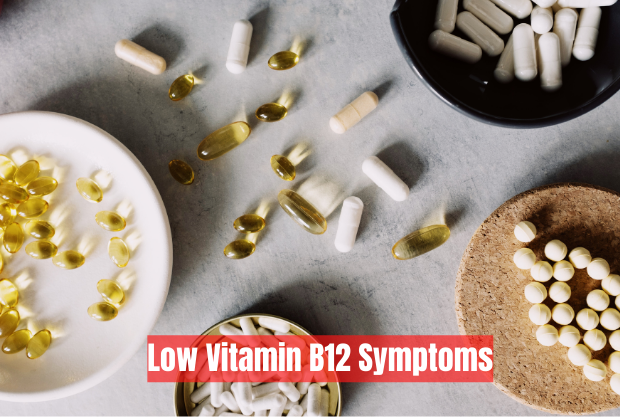Vitamin B12 deficiency is one of the most serious health problems that people can face, and it can be quite easy to develop if you’re not careful. The importance of B12 lies in the fact that low vitamin b12 symptoms include anemia, fatigue, weakness, pale skin, stomach pain, and more, but don’t think that the only way to prevent this condition is through your diet alone!

In this article, we’ll explore all of the ways that you can prevent low vitamin b12 symptoms from developing in the first place and ensure that you always get enough of this important nutrient.
Causes of Low Vitamin B12
Anemia is a common symptom of a deficiency in vitamin B12. Low levels of vitamin B12 are often found in people with anemia, but other causes include intestinal problems, gastric surgeries, or a diet that lacks animal products.
Intestinal problems can prevent your body from absorbing enough vitamin B12 from food. Gastric surgeries such as gastric bypass can make it hard for your stomach to break down food, including proteins that contain large amounts of vitamin B12.
If you have these procedures done, talk with your doctor about vitamin supplementation so you’re not at risk for developing low-level symptoms related to low-level vitamins.
Signs You Need More Vitamin B12
Vitamin B12 is essential for normal development, particularly of brain and nervous system cells. Low levels can cause symptoms including pale-yellow skin, sore-red tongue, mouth ulcers, pricking sensation in your hands or feet, movement anomaly or vision problems.
It can also cause irritability and depression. If you think you may be suffering from low vitamin b12 levels you should seek medical advice. There are a number of ways to increase your intake of vitamin b12 via foods such as meat and fish. However it’s also possible to take natural supplements to increase your vitamin b12 levels.
Sources of Vitamin B12
As you’ve learned, vitamin B12 is necessary for a number of bodily functions. Your body absorbs vitamin B12 through food or supplements. Vegetarian and vegan diets lack vitamin B12 naturally, since it’s found primarily in animal products. Thus, vegetarians are at an increased risk of developing low levels of vitamin b12.
The best sources of vitamin b12 include: Eggs, Fish, Meat, Milk Products, and Poultry. Vegetables only provide negligible amounts of vitamin b12, so they are not a good source for supplementing your diet with this nutrient.
However, some fortified breakfast cereals do contain significant amounts of vitamin b12. For example, 1 cup of Kellogg’s All-Bran cereal contains over 8% of your daily value (DV) for vitamin B12!
If you don’t eat eggs or dairy products and still want to maintain healthy levels of vitamin b12 in your body, look into taking a supplement. The recommended daily allowance (RDA) for adults between 19-50 years old is 2.4 micrograms per day. You can easily get all that you need from one serving of fortified cereal!
Home Remedies
While synthetic vitamins may be easier on your budget, natural vitamins—like beetroot, wheatgrass, alfalfa, moringa, green amla, eggs, fish and meat—can help prevent low vitamin b12 symptoms.
People of all ages can benefit from a variety of these supplements but seniors are especially at risk for developing a deficiency. Talk to your doctor about whether or not you need supplementation and how much you should be taking daily.
Medication Options
Several prescription medications are available for treating low vitamin B12. These include: mecobalamin (used for people with vitamin B12 deficiency due to a lack of intrinsic factor), hydroxocobalamin (for pernicious anemia), cobalamin (to treat lack of intrinsic factor) and cyanocobalamin [1] (to treat cyanide poisoning).
It’s important to remember that all medications have their pros and cons, so it’s best for anyone considering taking prescription medication for a condition like low vitamin B12 symptoms, potential side effects. Combination products may also be available.

Lifebing is driven by an unrelenting passion for promoting health and well-being, our team is wholly committed to curating exceptional content and immersive experiences.
